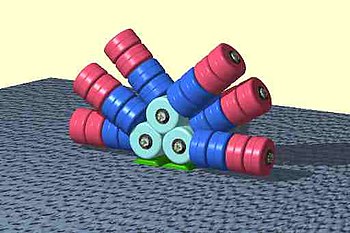Talk:Light-harvesting complex
| This article is rated Start-class on Wikipedia's content assessment scale. It is of interest to the following WikiProjects: | |||||||||||||||||||||
| |||||||||||||||||||||
Untitled
[edit]I've recently started this article alongside reaction centre. These are closely related subject; They are both proteins involved in the process of photosynthesis. I will be expanding this stub into a thorough article over the coming weeks.
Why not check out reaction centre in the meantime?
Wiki Education Foundation-supported course assignment
[edit]![]() This article was the subject of a Wiki Education Foundation-supported course assignment, between 11 January 2021 and 7 April 2021. Further details are available on the course page. Student editor(s): Lilium00.
This article was the subject of a Wiki Education Foundation-supported course assignment, between 11 January 2021 and 7 April 2021. Further details are available on the course page. Student editor(s): Lilium00.
Above undated message substituted from Template:Dashboard.wikiedu.org assignment by PrimeBOT (talk) 02:34, 17 January 2022 (UTC)
Proposed move of LHC dab page
[edit]I've proposed moving LHC to LHC (disambiguation) to allow LHC to redirect to Large Hadron Collider with an appropriate {{this}} transclusion. I'm notifying editors of each of the pages linked from the current dab page to help generate discussion from interested parties. The discussion can be found at Talk:LHC#Requested move. -- Mark Chovain 01:11, 14 April 2008 (UTC)
Phycobilisome [citation needed]
[edit]
This image looks very strange for a protein: it seems extremely simplistic and drawn in a unusual way for a protein structure. Question: what is the source for this image? A reference would be welcome. Shinkolobwe (talk) 23:46, 8 February 2009 (UTC)
- The image depicts the whole assembly of a lot of proteins, not a single protein structure. Each of those red or blue cylinders is a separate protein unit. This is really trivial stuff, any photosynthesis/algae textbook will probably contain similar illustration.158.75.4.216 (talk) 13:06, 27 November 2009 (UTC)
This section seems to contradict itself when it says that little red light makes it down to 1 meter, and yet the pigments possessed by algae at this depth are targeted to green and red light. I thought red light could make it down this far.
Cypher3c (talk) 00:25, 26 January 2010 (UTC)
I dont know who is writing this page, but you make many mistakes. Please be careful with assigning the LHC's to plants and bacteria. LH-I, LH-II, (better LH1 and LH2) are from purple bacteria. The picture under question here is a phycobilisome that consists of many proteins. The picture is actually a real physical model and not a X-ray structure. —Preceding unsigned comment added by 130.37.31.85 (talk) 15:10, 8 February 2010 (UTC)
What is the first reference in External links? Doesn't seem to work. Superfamily 1 seems to include many unrelated proteins.
Cool site though. — Preceding unsigned comment added by 173.230.160.240 (talk) 00:50, 2 November 2014 (UTC)
Including reaction centres functioning.
[edit]When we say that the antenna complex is transferring energy through forster resonance, I'd like to add too: "as opposed to/until it reaches the reaction centre, which, when it recieves the energy, shoots an electron to the fotosynthetic chain". --186.136.240.135 (talk) 20:40, 26 May 2016 (UTC)

